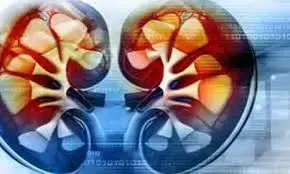- Home
- Medical news & Guidelines
- Anesthesiology
- Cardiology and CTVS
- Critical Care
- Dentistry
- Dermatology
- Diabetes and Endocrinology
- ENT
- Gastroenterology
- Medicine
- Nephrology
- Neurology
- Obstretics-Gynaecology
- Oncology
- Ophthalmology
- Orthopaedics
- Pediatrics-Neonatology
- Psychiatry
- Pulmonology
- Radiology
- Surgery
- Urology
- Laboratory Medicine
- Diet
- Nursing
- Paramedical
- Physiotherapy
- Health news
- Fact Check
- Bone Health Fact Check
- Brain Health Fact Check
- Cancer Related Fact Check
- Child Care Fact Check
- Dental and oral health fact check
- Diabetes and metabolic health fact check
- Diet and Nutrition Fact Check
- Eye and ENT Care Fact Check
- Fitness fact check
- Gut health fact check
- Heart health fact check
- Kidney health fact check
- Medical education fact check
- Men's health fact check
- Respiratory fact check
- Skin and hair care fact check
- Vaccine and Immunization fact check
- Women's health fact check
- AYUSH
- State News
- Andaman and Nicobar Islands
- Andhra Pradesh
- Arunachal Pradesh
- Assam
- Bihar
- Chandigarh
- Chattisgarh
- Dadra and Nagar Haveli
- Daman and Diu
- Delhi
- Goa
- Gujarat
- Haryana
- Himachal Pradesh
- Jammu & Kashmir
- Jharkhand
- Karnataka
- Kerala
- Ladakh
- Lakshadweep
- Madhya Pradesh
- Maharashtra
- Manipur
- Meghalaya
- Mizoram
- Nagaland
- Odisha
- Puducherry
- Punjab
- Rajasthan
- Sikkim
- Tamil Nadu
- Telangana
- Tripura
- Uttar Pradesh
- Uttrakhand
- West Bengal
- Medical Education
- Industry
Urate-lowering therapy may not improve kidney and cardiovascular outcomes

Urate-lowering therapy did not produce benefits on the clinical outcomes, including major adverse cardiovascular events, all-cause mortality, and kidney failure according to recent research published in the Clinical Journal of the American Society of Nephrology.
Several clinical practice guidelines noted the potential benefits of urate-lowering therapy on cardiovascular disease and CKD progression; however, the effect of this regimen remains uncertain.
"In this systematic review, we aimed to evaluate the efficacy of urate-lowering therapy on major adverse cardiovascular events, all-cause mortality, kidney failure events, BP, and GFR", describes Qi Chen and colleagues from the Department of Nephrology, Dongzhimen Hospital, The First Affiliated Hospital of Beijing University of Chinese Medicine, Beijing, China.
"We systematically searched MEDLINE, Embase, and the Cochrane databases for trials published through July 2020. We included prospective, randomized, controlled trials assessing the effects of urate-lowering therapy for at least 6 months on cardiovascular or kidney outcomes. Relevant information was extracted into a spreadsheet by two authors independently. Treatment effects were summarized using random-effects meta-analysis", they further explained.
By analyzing 28 trials comprising 6,458 participants, researchers investigated whether urate-lowering therapy has efficacy on major adverse cardiovascular events, all-cause death, kidney failure events, BP, and GFR.
Based on the design and the methodology of the study, the following findings were observed-
- Overall urate-lowering therapy did not show benefits on major adverse cardiovascular events (risk ratio, 0.93; 95% confidence interval, 0.74 to 1.18) and all-cause mortality (risk ratio, 1.04; 95% confidence interval, 0.78 to 1.39) or kidney failure (risk ratio, 0.97; 95% confidence interval, 0.61 to 1.54).
- Urate-lowering therapy attenuated the decline in the slope of GFR (weighted mean difference, 1.18 ml/min per 1.73 m2 per year; 95% confidence interval, 0.44 to 1.91) and lowered the mean BP.
- There was no significant difference (risk ratio, 1.01; 95% confidence interval, 0.94 to 1.08) in the risk of adverse events between the participants receiving urate-lowering therapy and the control group.
Therefore, the authors then concluded by saying that, "urate-lowering therapy did not produce benefits on the clinical outcomes, including major adverse cardiovascular events, all-cause mortality, and kidney failure. Thus, there is insufficient evidence to support urate-lowering in patients to improve kidney and cardiovascular outcomes."
Dr Kartikeya Kohli is an Internal Medicine Consultant at Sitaram Bhartia Hospital in Delhi with super speciality training in Nephrology. He has worked with various eminent hospitals like Indraprastha Apollo Hospital, Sir Gangaram Hospital. He holds an MBBS from Kasturba Medical College Manipal, DNB Internal Medicine, Post Graduate Diploma in Clinical Research and Business Development, Fellow DNB Nephrology, MRCP and ECFMG Certification. He has been closely associated with India Medical Association South Delhi Branch and Delhi Medical Association and has been organising continuing medical education programs on their behalf from time to time. Further he has been contributing medical articles for their newsletters as well. He is also associated with electronic media and TV for conduction and presentation of health programs. He has been associated with Medical Dialogues for last 3 years and contributing articles on regular basis.
Dr Kamal Kant Kohli-MBBS, DTCD- a chest specialist with more than 30 years of practice and a flair for writing clinical articles, Dr Kamal Kant Kohli joined Medical Dialogues as a Chief Editor of Medical News. Besides writing articles, as an editor, he proofreads and verifies all the medical content published on Medical Dialogues including those coming from journals, studies,medical conferences,guidelines etc. Email: drkohli@medicaldialogues.in. Contact no. 011-43720751


